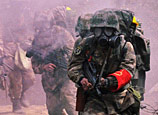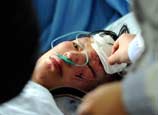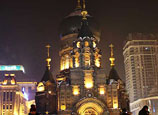
BEIJING, Jan. 14 (Xinhua) -- Choked in dense smog for three consecutive days, Beijing started emergency response measures on Sunday to curb the hazardous air pollution.
Yet more efforts are needed to control pollution in the long run both in Beijing and other Chinese cities, where the air has held excessive levels of major pollutants in the past few days.
Monitoring data showed the Air Quality Index in most parts of the capital reached 500, the maximum level of pollution, on Sunday morning.
By 2 p.m. Sunday, readings for PM2.5, or airborne particles measuring less than 2.5 micrometers in diameter, had dropped slightly to 300-400 micrograms per cubic meter of air at many monitoring sites in Beijing, but remained 600 to 700 at several sites in the city's southeast, according to environmental authorities.
"Such prolonged pollution is rare in Beijing," said a university student who only gave his surname, Wang. He wore a mask to "avoid pollution and flu infection."
The 22-year-old student, who has been living in Beijing since childhood, told Xinhua he expected the government to take more timely and effective actions, such as the dissemination of air pollution information and the suspension of classes for children, who are vulnerable to diseases.
Doctors with Beijing Chaoyang Hospital and Beijing Children's Hospital said the number of patients experiencing respiratory problems had jumped sharply in the past few days.
 |
















 China's social trust index declined further last year, according to the Annual Report on Social Mentality of China 2012
China's social trust index declined further last year, according to the Annual Report on Social Mentality of China 2012


![]()
